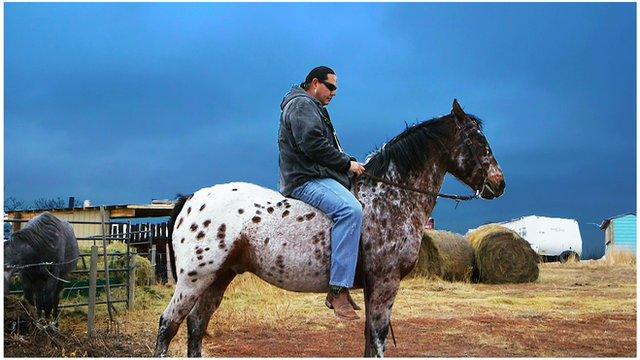Deb Haaland: America’s first Native cabinet secretary
- Published
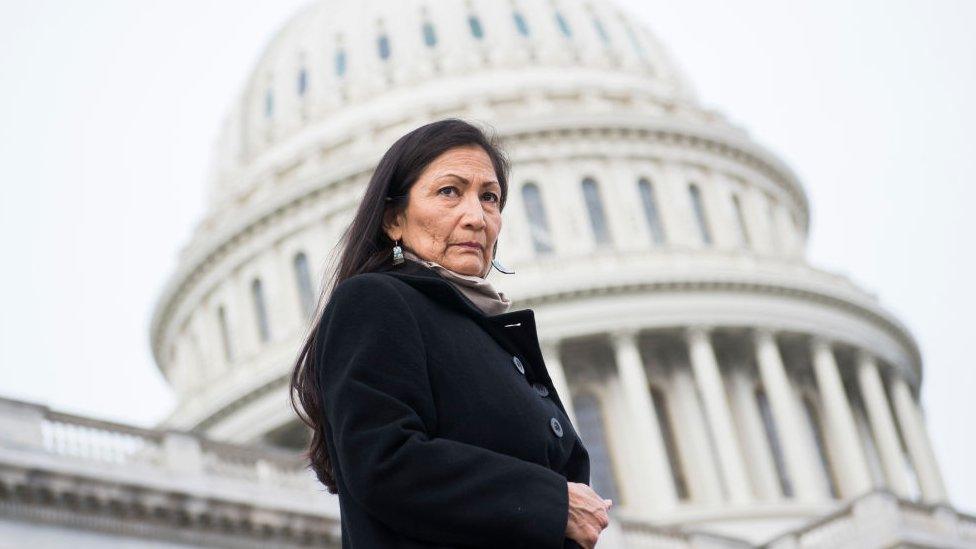
To some, she's New Mexico politician Deb Haaland. To Native Americans, she's Auntie Deb. And Auntie just took the helm at the 172-year-old federal agency that most closely oversees Native affairs.
The Senate on Monday confirmed Ms Haaland as Interior Secretary by a vote of 51 to 40, making her the first Native cabinet secretary in US history.
Her historic selection to lead the Department of the Interior marks, as one Democratic Party lawmaker put it, history coming full circle. The agency manages over 500 million acres of public land, much of which was once seized from indigenous people. It also houses the Bureau of Indian Affairs (BIA), which services the 574 federally recognised Native tribes - as well as the 1.9 million American Indians and Alaska Natives - in the country.
The choice of Ms Haaland is not merely symbolic though. President Joe Biden has pledged to aggressively decarbonise the US economy and to work more closely with Native tribes, two goals Ms Haaland's backers argue she is uniquely qualified to act on.
"As Native people, we aren't always used to having a seat at the table," says Rosalie Fish, a young Native athlete and advocate. "Now somebody - one of our own people - has finally risen up against the odds and is taking a stance for us."
It caps a remarkable rise in politics for Ms Haaland, a single mother once struggling to pay the bills.
'We must be fierce'
By the time she burst onto the national scene in 2018 as one of the first two Native American women elected to Congress, Ms Haaland was already a familiar face in New Mexico politics.
An enrolled member of the Laguna Pueblo, a 7,700-member tribe in west-central New Mexico, she calls herself a 35th generation New Mexican who traces her roots there to the 1200s.
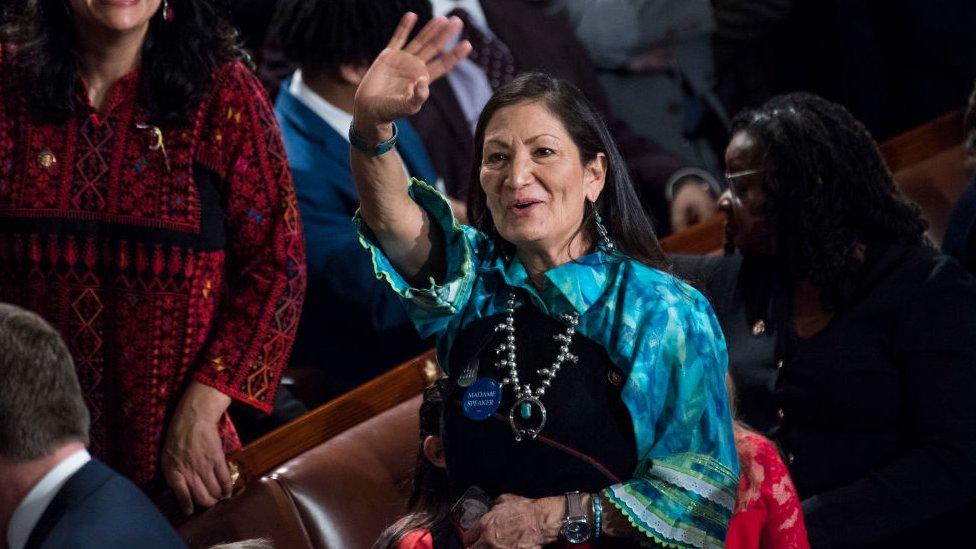
Ms Haaland wore her traditional Pueblo attire on her first day as a new member of Congress
Her father, a Norwegian American from Minnesota, served in the Marine Corps for three decades and her mother, a Native woman, was in the Navy. Ms Haaland was born in a small railroad town in Arizona, then bounced from school to school with each new posting her parents received, before they finally settled in New Mexico's biggest city, Albuquerque.
Four days after graduating from the University of New Mexico (UNM) in 1994, she gave birth to her only daughter Somah. She would later say that being a single mother was "a choice I made".
When Somah was two, Ms Haaland started a small business selling homemade salsa. With her daughter in the backseat, she'd drive around the state to hawk her product.
And when Somah started pre-school, her mother volunteered there so she could afford the cost of tuition. Ms Haaland would later recall that the duo moved in with others on several occasions because she couldn't afford to pay for an apartment and even once applied for emergency food assistance.
BBC Pop Up: Life as a young Native American in South Dakota
In the mid-2000s, she went back to school at UNM, earning a degree in Indian Law. (Now 60 years old, she claims she is still paying off the student debt.)
Her entry into Democratic politics came as a campaign volunteer and grassroots organiser, first for John Kerry in 2004 and then for Barack Obama in 2008 and 2012.
After an unsuccessful run for Lieutenant Governor of New Mexico in 2014, Ms Haaland won a two-year term as the chairwoman of the state Democratic Party. During her tenure, she delivered on promises to win back the statehouse and to pay off seven years worth of debt.
Soon after, she launched a bid for Congress with a promise to punch back against a polarising president: "In the face of Donald Trump and men like him, we must be fierce."
Allow X content?
This article contains content provided by X. We ask for your permission before anything is loaded, as they may be using cookies and other technologies. You may want to read X’s cookie policy, external and privacy policy, external before accepting. To view this content choose ‘accept and continue’.

She touted her background as a single mother, a small business owner and a fighter for her community. She was forthcoming about past struggles with alcoholism and money.
She won easily.
#DebForInterior
In Congress, the freshman quickly burnished her credentials with the left-wing of the Democratic Party, advocating for the Green New Deal climate proposal, a single-payer healthcare system and other left-wing policy priorities.
"Deb Haaland has indigenous values," says Ms Fish. "It's about restorative justice, restoring social issues, restoring the environment.
"For one of the few times in my life, I actually see somebody who's speaking out for me."
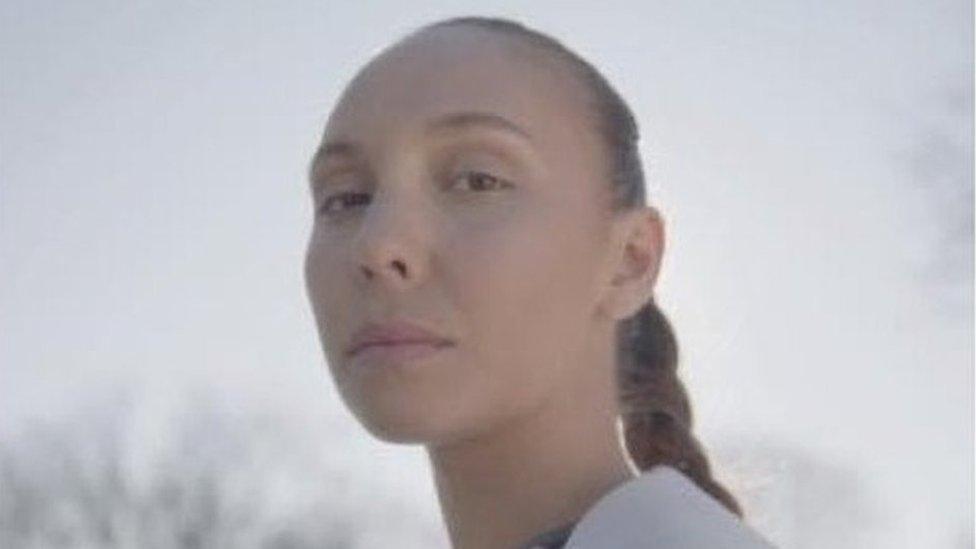
Rosalie Fish, 20, says it feels "empowering" to see Deb Haaland win a seat at the table because Native women have been neglected for too long
But Ms Haaland also garnered a reputation as an effective lawmaker. According to her GovTrack report card, external, she led, co-sponsored and whipped votes for more bills than any of her freshman colleagues. Five of the rookie congresswoman's bills have been signed into law, a notable feat in a hyper-partisan era.
So, when her name was floated by the incoming Biden team as a potential contender for Interior Secretary, whispers of encouragement quickly turned into waves of endorsement.
In letters to the Biden administration and members of the US Senate, hundreds of groups representing public lands, outdoor business, environmental justice and indigenous interests said the choice was "fitting and long overdue". Over 100 tribal leaders, both left-leaning and right-leaning, argued she was "more than qualified and capable" of doing the job.
Over 50 of Ms Haaland's House Democrat colleagues wrote, external of her passion and zeal as the vice chair of the Natural Resources Committee. Democratic senator Elizabeth Warren remarked on her "top-notch command of policy". House Speaker Nancy Pelosi gave her blessing to "one of the most respected and one of the best members of Congress I have served with".
When her confirmation process began, Natives mobilised en masse to show their support for her, issuing tens of thousands of letters of endorsement, commissioning artworks and short films, and even projecting an image of Ms Haaland onto the Interior building.
Allow Instagram content?
This article contains content provided by Instagram. We ask for your permission before anything is loaded, as they may be using cookies and other technologies. You may want to read Meta’s Instagram cookie policy, external and privacy policy, external before accepting. To view this content choose ‘accept and continue’.

At her hearing, Ms Haaland was introduced by Don Young, an 87-year-old Republican friendly to the fossil fuel industry, who praised her as "a consensus builder".
But several Republicans objected to her selection, arguing she was "radical" and "a partisan".
A handful of them tried to block or further delay her confirmation, insisting her policies would wreak havoc on US energy markets.
The flurry of support for Ms Haaland drowned them out. Four Republicans ultimately voted with all Democrats to confirm her as the next interior secretary.
Explaining why he voted yes, Lindsey Graham of South Carolina cited a letter he had received from a tribal leader in his state.
And Lisa Murkowski of Alaska, home to the largest Native population in the country, told her colleagues: "[Natives] are paying attention to this nomination, believe me".
"We've been erased from history and it's taken Native creators, advocates, speakers and people on all platforms to get their own seats at the table, whether people wanted us to take that seat or not," says Ms Fish, explaining the momentum behind #DebForInterior.
'She can do anything'
On Joe Biden's first day in office, he cancelled the lucrative Keystone XL pipeline project.
Less than five years ago, Native Americans were fighting a similar project: the Dakota Access Pipeline in North Dakota.
The Standing Rock Sioux tribe, whose reservation lies in the path of the pipeline, warned it would compromise their main source of water and defied authorities in 2016 by setting up a blockade.
Their fierce resistance in the face of a powerful law enforcement response rallied Natives from around the country to their cause. Deb Haaland visited the encampments too and reportedly cooked for demonstrators.
It is one of the reasons Natives describe an "unconditional love" for her and "the utmost faith" in her ability to effect change. They trust the former activist is on their side and determined to act on the issues that matter to them.
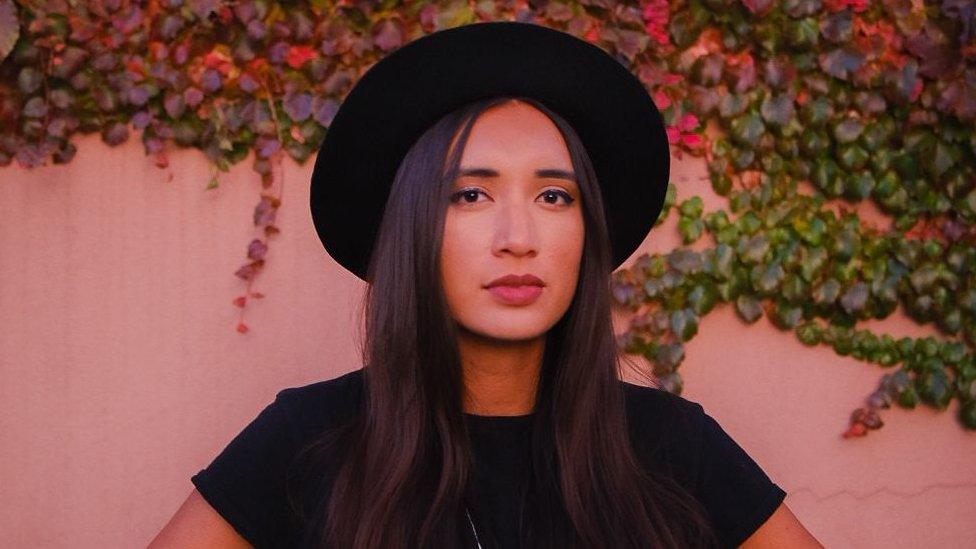
Raye Zaragoza, 27, considers Deb Haaland a friend, "a kindred spirit" and a reminder of what is possible for women of colour
"Deb Haaland is deeply rooted in community, is centered in Native values, and was recognised as a leader long before she was an elected representative in Congress," said Crystal Echo Hawk of the IllumiNatives advocacy group.
"She can fundamentally reset and transform the relationship the US government has with tribes."
Ms Fish hopes Ms Haaland will bring particular attention to the issue of missing and murdered indigenous people. Last year, the Department of Justice found that Native women are killed at 10 times the national average.
In fact, Ms Fish's own aunt, Alice Looney, was found dead in 2005 nearly a year after going missing. Her killer has not been identified, one of many cold cases and empty trails.
"A lot of the neglect that happens is in the connections at the tribal, federal and state levels," she explains, "and I absolutely think Deb will have the perspective needed to take care of these issues."
Raye Zaragoza, an indigenous folk singer and songwriter, went to Standing Rock too. After going viral for her single protesting about the treatment of Natives at the site, she has continued to write songs of an activist vein.
One of her newer singles, "Fight Like A Girl", is partly inspired by Ms Haaland and was largely written after the duo met for the first time.
Calling it an anthem for unsung heroines of colour, she says it reminds her that "Deb Haaland can do anything. I can do anything. Other girls of colour can do anything."
"Folks are so afraid of what it would mean to have those that have been oppressed for so many years and who have a holistic picture of the real American story to be leading America," she said.
"It's time that changed."
Related topics
- Published17 December 2020
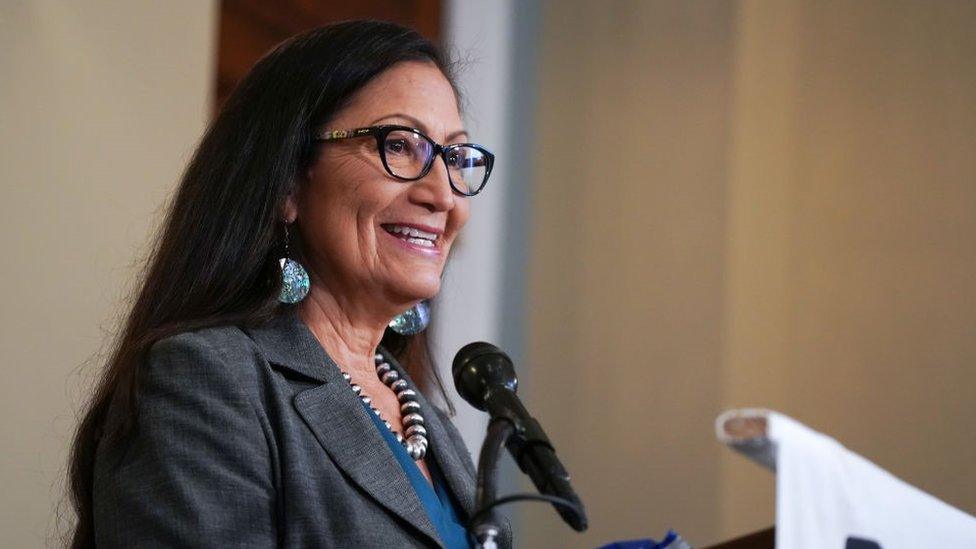
- Published25 January 2021
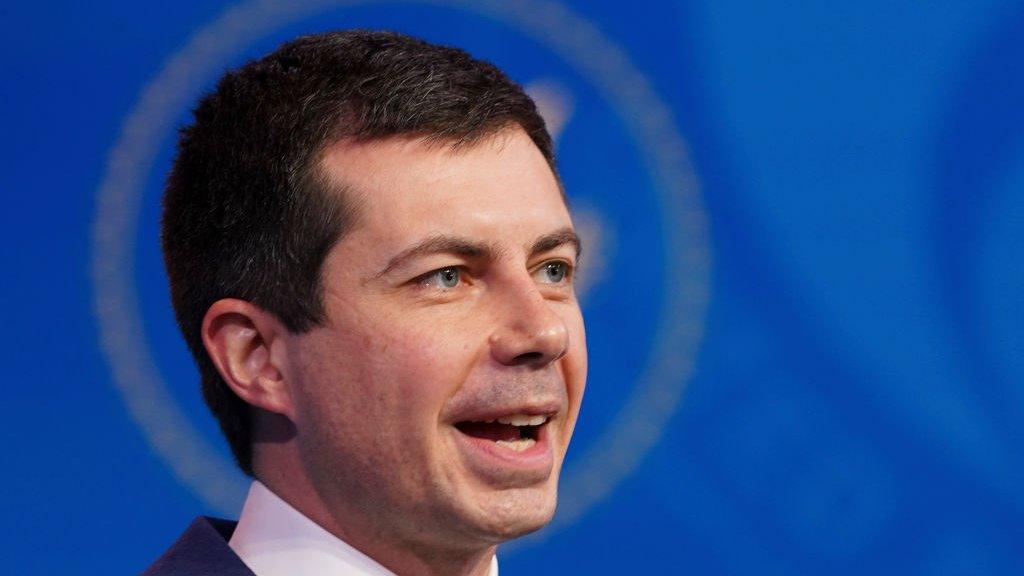
- Published2 November 2018
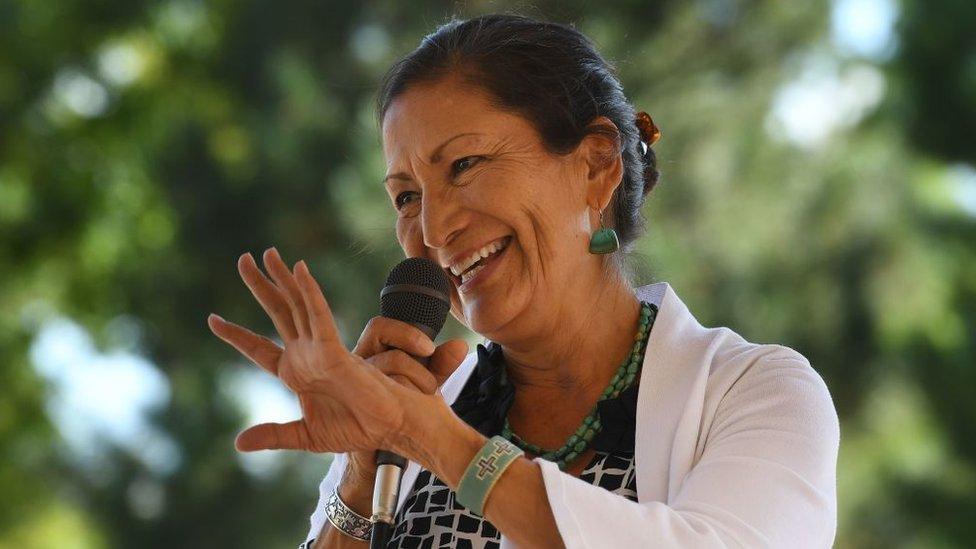
- Published16 June 2020
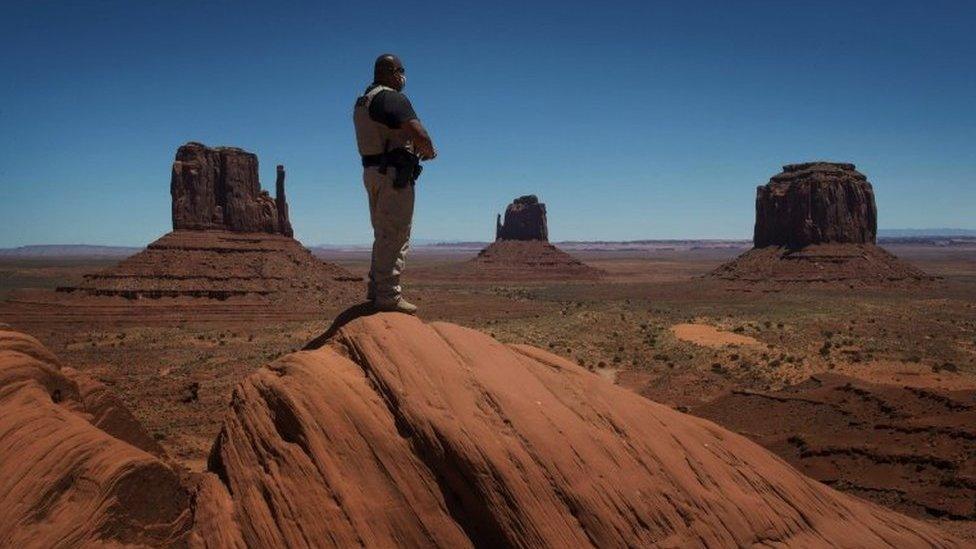
- Published2 January 2015
